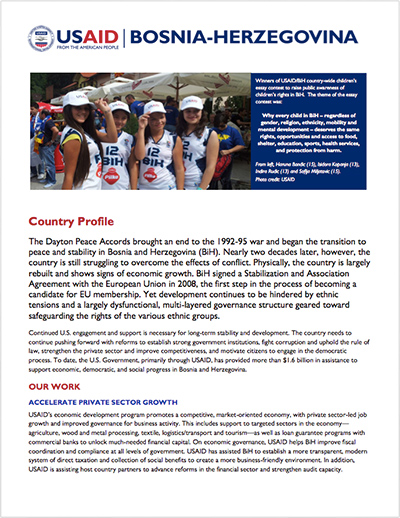Country Profile
The Dayton Peace Accords brought an end to the 1992-95 war and began the transition to peace and stability in Bosnia and Herzegovina (BiH). More than 20 years later, however, the country is still struggling to overcome the effects of conflict. The country is largely rebuilt, but economic growth remains slow. Progress, however, includes the Stabilization and Association Agreement between the EU and BiH, which entered into force in 2015. BiH formally applied for EU membership the following year, and the EU accepted the application in September 2016.
Yet development continues to be hindered by ethnic tensions and a largely dysfunctional, multilayered governance structure. Continued U.S. engagement and support is necessary for longterm stability and development. The country needs to continue pushing forward with reforms to establish strong government institutions, fight corruption and uphold the rule of law, strengthen the private sector and improve competitiveness, and motivate citizens to engage in the democratic process.
To date, the U.S. Government, primarily through USAID, has provided more than $1.7 billion in assistance to support democratic, social, and economic progress in Bosnia and Herzegovina.
OUR WORK
PRIVATE SECTOR GROWTH
USAID’s economic development program promotes a competitive, market-oriented economy, with private sector-led job growth and improved governance for business activity. This includes support to targeted sectors in the economy—agriculture, wood and metal processing, textile, logistics/transport and tourism—as well as loan guarantee programs with commercial banks to unlock much-needed financial capital. On economic governance, USAID helps BiH improve fiscal coordination and compliance at all levels of government. USAID has assisted BiH to establish a more transparent, modern system of direct taxation and collection of social benefits to create a more business-friendly environment. In addition, USAID is assisting host country partners to advance reforms in the financial sector and strengthen audit capacity.
USAID helps private businesses capitalize on economic potential and opportunities at the local level; the assistance will result in domestic and foreign direct investment, more competitive local industry and new sustainable jobs, especially in the targeted sectors, especially for small and medium-sized enterprises. USAID projects help connect producers to markets and introduce new technologies along the entire value chain. This includes assistance in USAID works with BiH on energy policy to help the country maximize its potential in the region as a net energy exporter. Workshop participant at the USAID-supported 3rd BiH Energy Summit in Neum, which gathered 400 people from the government and energy sector. (Photo credit: USAID) marketing BiH as a tourist destination and helping local producers meet EU quality and safety standards in agriculture, wood processing, and light manufacturing. USAID works on energy efficiency and energy policy to help BiH maximize its potential as a net energy exporter and to increase competition.
DEMOCRATIC GOVERNANCE
USAID’s democracy and governance assistance helps BiH develop more functional and accountable institutions that meet citizens’ needs. USAID helps increase citizen participation in political and social decision-making. USAID assists civil society to engage with a wide array of stakeholders and form issuebased networks to work on matters of concern to citizens and broader constituencies. Civil society programs strengthen local efforts to influence policymaking and develop indigenous initiatives to counter corruption and advocate for better governance and transparency.
USAID projects provide assistance to prosecutors and judges to better investigate and prosecute corruption cases, reduce case backlogs, and better enforce court decisions. USAID assists elected representatives to develop, draft, advocate and implement legislation and improve their responsiveness and accountability to their constituents. USAID strengthens legal systems to provide transparent access to justice for all citizens.
RECONCILIATION
Conflicting historical and political narratives in which citizens blame each other for the 1992-95 war define the perceptions and attitudes of people at every age and level of society in BiH. As a result, achieving societal cohesion, social well-being, and economic prosperity is arduous. To build trust across communities and at the national level, USAID’s reconciliation programs actively engage BiH political, government, religious, and education officials and other key influencers, as well as youth, war victims, women, religious communities, associations of war victims, and civil society groups. USAID provides opportunities for these BiH leaders and citizens to challenge and change their own beliefs about one another, and then start transforming their communities. If citizens begin to trust each other’s intentions, they will be able to engage and collaborate on issues of common concern. USAID provides several small grants for community reconciliation and conflict mitigation.
CROSS-CUTTING PRIORITIES
Youth and women’s empowerment are priorities across all USAID programs. USAID supports BiH youth and women to increase their civic and economic opportunities, to become responsible and productive citizens involved in and integral part of the country’s future.








Comment
Make a general inquiry or suggest an improvement.